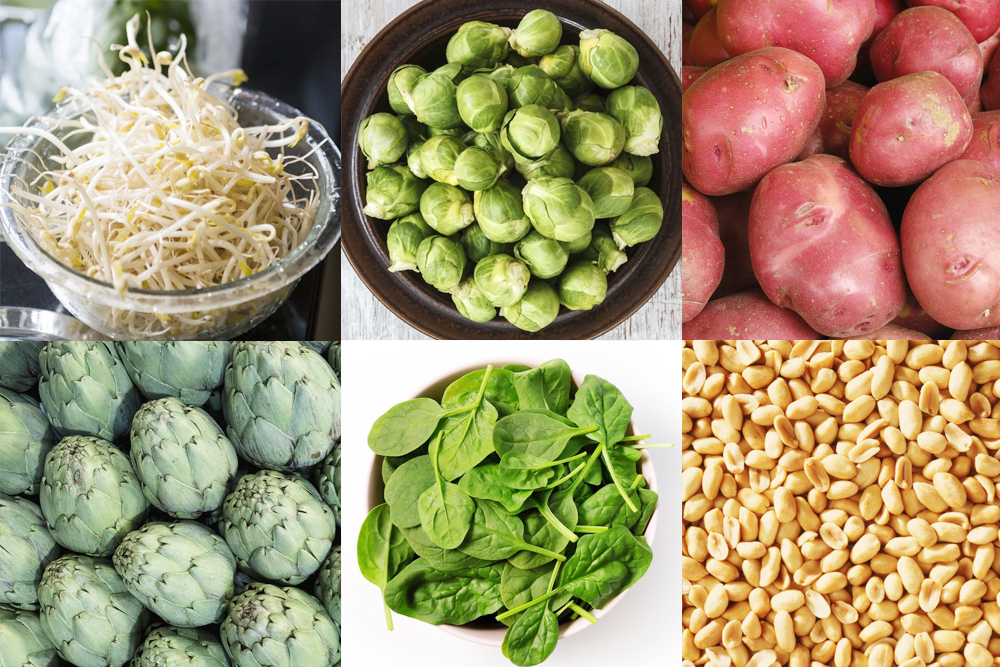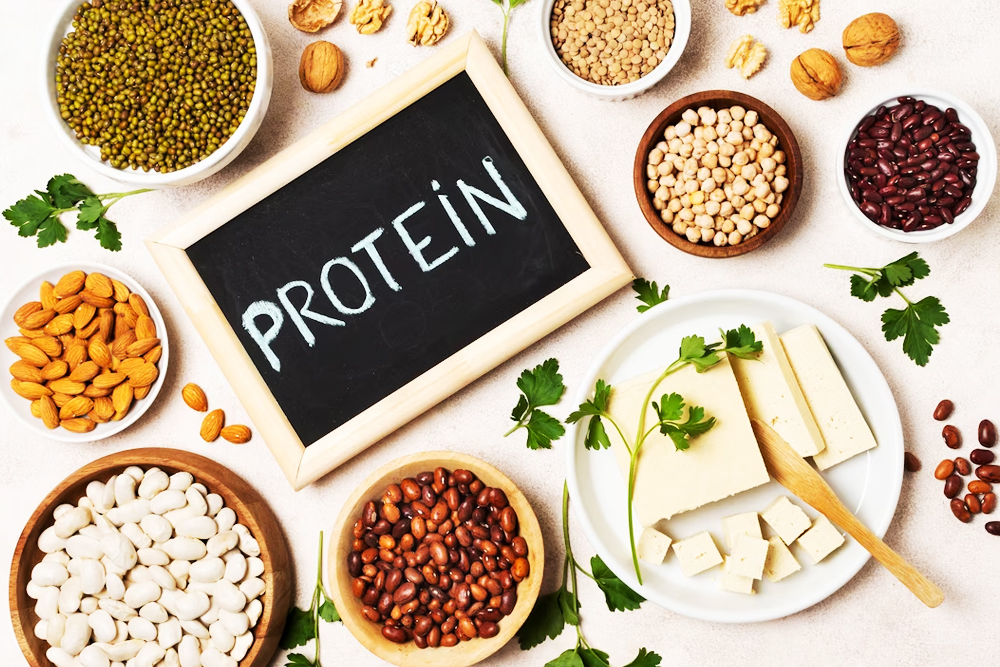High protein vegetables you must add to your diet
These tasty vegetables are full of protein, as well as other essential vitamins and minerals. It’s possible to get all of the protein you need from a plant-based or vegan diet. Here are some protein-packed vegetables that every vegan or vegetarian should add to their daily diet.
Here are some of the top high-protein vegetables to add to your diet:
1. Broccoli:
Protein: 5 grams per cup, cooked
Broccoli isn’t only an awesome source of fiber—it’s also a surprisingly great way to reach your daily protein goal. Plus, you can’t go wrong with a vegetable that’s linked to cancer-preventing properties, either. We love it in a stir-fry, but you can always steam, bake, or puree the vegetable with just about anything.
2. Mushrooms:
Protein: 4 grams per cup, cooked
All mushrooms, from shiitake to oyster, have a decent amount of protein in them. But white mushrooms have the most — and they happen to be some of the most ubiquitous. Throw them into basically any dinner (we suggest arugula pizza, bacon pasta, and mole tacos) for a boost of umami and protein.
3. Edamame:
Protein: 11 g per 100 g
Talk about the healthiest appetizer ever—simply delicious to eat as a snack or thrown into soups or vegetable stir-fry.

4. Corn:
Protein: 4 grams per cup, cooked
Like potatoes, corn often gets put into the “plants with no redeeming qualities” category, but with loads of fiber, folate, vitamin C, and magnesium (not to mention protein), it’s worth adding to your next meal, both fresh and frozen . If you are still eating meat, serve it with chicken; if not, try it in coconut soup.
5. Snow Peas:
Protein: 5 grams per cup, cooked
Snow peas pack lots of protein, both raw and cooked, making them a perfect addition to meals that could use a fresh, plant-based snap, including pesto tortellini and ricotta toast. You’ll also get a hefty dose of fiber and vitamin C with each serving — pretty impressive for such a satisfying snack.
6. Artichokes:
Protein: 5 grams per cup, cooked
Artichokes shouldn’t just be relegated to dippings. (Although, to be clear, they’re pretty good in dips). The low-calorie, nutrient-dense veggies include huge amounts of folate and vitamins C and K, and they’re wonderful in sheet pan dinners, in roasted sides, and even on top of pizzas — they’ve been hiding in plain sight all thistime.
7. Lima Beans:
Protein: 7.8gm per 100gm
Lima Beans not only contains protein but also amino acid leucine, which plays a big role in healthy muscle synthesis among older people.
8. Brussels Sprouts:
Protein: 5.5 grams per cup, cooked
These little green veggies have always gotten an unfairly bad rap, but they can be tasty, nutritional superstars, at least if you know how to cook them. In addition to protein, Brussels sprouts pack hefty doses of potassium and vitamin K.
9. Asparagus:
Protein: 4.25 grams per cup, cooked
Asparagus is stealthily protein-packed, meaning it’s a great secret weapon in any vegetarian’s refrigerator. Whether tossed with spaghetti and shrimp or pickled beside garlic, it’s the cornerstone of countless plant-based meals. Also, it’s rich in folate and vitamins K, A, and C.
10. Spinach:
Protein: 6 grams per cup, cooked
“Besides being really good for you,” Jones raves, “spinach offers exceptional nutritional value, and the health benefits of spinach are numerous.” The leafy green is loaded with goodies like calcium, folic acid, iron, fibre, and vitamins K and C. Even better, it’s easy to throw into pastas, salads, smoothies, and bowls.
11. Soybean Sprouts:
Protein: 9 grams per cup
Soybean sprouts are a crunchy and hefty dose of protein to plant-based dishes. If you’re tired of beans, sprouts, let’s you switch things up without sacrificing protein.
12. Mung Beans:
Protein: 7 grams per ½ cup, cooked
Rich in antioxidants, mung beans are tiny powerhouses of nutrition that are just begging to be incorporated into your next curry, soup, or salad. For an extra satisfying meal, add them to a veggie bowl filled with other plant-based proteins, including Brussels sprouts and walnuts — you can thank us later.

13. Red Potatoes:
Protein: 7 grams per 1 large cooked potato
Red potatoes (and white ones, too) are packed with protein, but what makes them special, notes Jones, is their high levels of dietary fiber and vitamin B6, which promote the metabolism of protein. Baked, mashed, or roasted with other vegetables, red potatoes are that rare combination of crowd-pleasing and healthy.
14. Lentils:
Protein: 8 grams per ½ cup, cooked
Low-cal, high-fibre lentils are a bona fide superfood. They don’t require soaking, says Jones, so lentil soup or curry is easy to whip up. Plus, she notes, they’re rich in folate, potassium, and copper, making them even healthier than the cereals they can replace. And don’t be afraid to get creative — how about lentil hummus?
15. Green peas:
Protein: 5.1gm per 100gm
Peas are a wonderful natural source of protein. They’re flavourful, protein-rich and adaptable. So, you can add them to a variety of food items to create delectable dinners and snacks.
16. Refried Beans:
Protein: 6.5 grams per ½ cup, cooked
Sugiuchi stuffs tacos and enchiladas with refried black and pinto beans, on top of eating them alone. “If you’re transitioning your family to more plant-based sources of protein, you can also mix them with ground beef or chicken to cut down on the amount of meat so you’re not making such a big change,” she says.
17. Chickpeas:
Protein: 7 grams per ½ cup, cooked
The combo of protein and fiber in chickpeas makes for a healthy bean. Of course, most of us know and love chickpeas from hummus, but they’re able to transform into nearly anything, from rich falafel to crunchy, baked snacks. They’re particularly good whole inside soups, salads, and even crepes.
18. Peanuts:
Protein: 8 grams per 1 oz
Yes, peanuts are legumes, meaning they are technically a vegetable. A 1-ounce serving packs in nearly 8 grams of protein, making it (and peanut butter) an ideal snack before or after the gym. The legumes are also easy to incorporate into unexpected recipes, from protein-packed pancakes to tacos.
19. Spinach:
Protein: 5.8g per 200grams
Apart from being very good for you, it offers extraordinary nutritional values and health benefits. Even better, it’s easy to toss into pasta, salads, smoothies and bowls.
20. Fava beans:
Protein: 7.6g per 100gm
Also knows as broad beans, fava beans should be a bigger staple of our daily meals, since they work in anything from soups, salads and even dips.
21. Black Beans:
Protein: 8 grams per ½ cup, cooked
On top of providing plenty of protein, black beans are also packed with heart-healthy fibre, potassium, folate, vitamin B6, and a range of phytonutrients. You can absolutely make a meal out of them alone (black bean burgers, anyone?), but they’re also easy to slip into virtually any dish, Jones explains, including soups and stir-fries.











